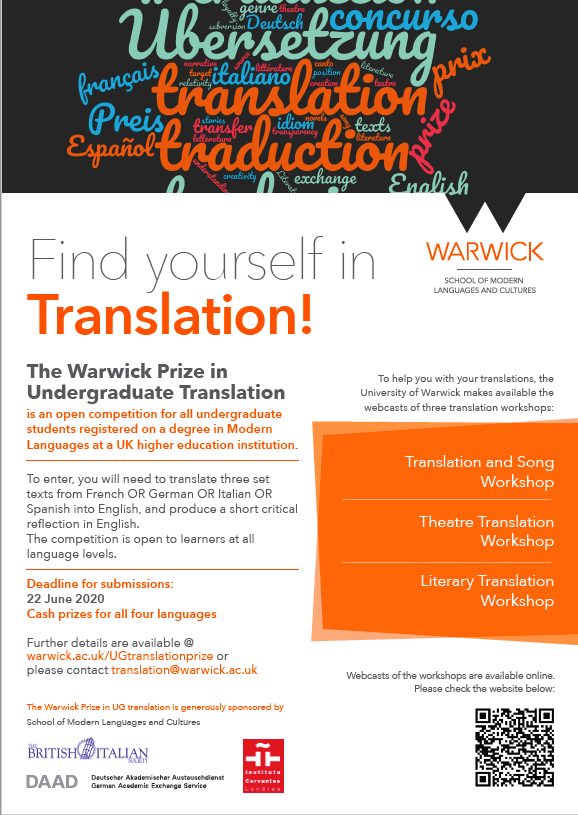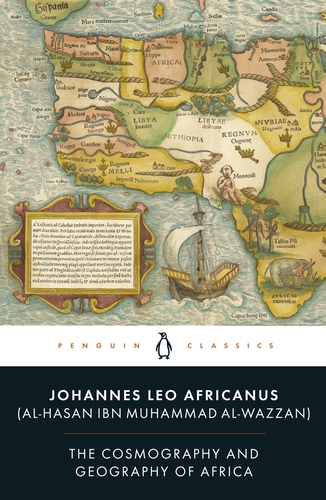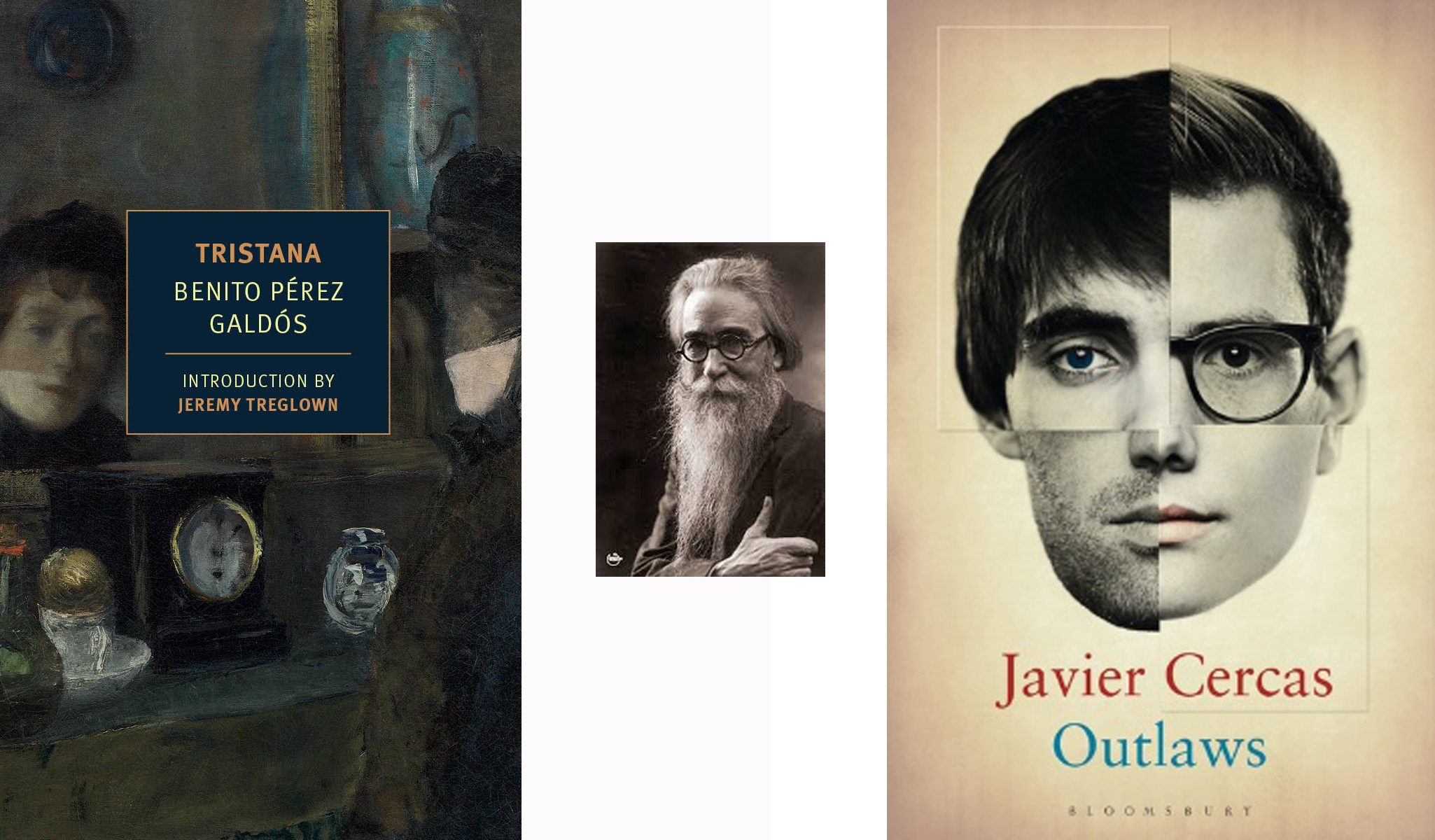The Cosmography and Geography of Africa published today
Today Penguin Classics is publishing The Cosmography and Geography of Africa, by Leo Africanus, a Moroccan diplomat born in Granada, Spain. This is the first English translation in over 400 years of one of the greatest and most influential works of Renaissance literature.
Modern and lucid, this new translation is the first based on an undiscovered manuscript unearthed in Italy on the precipice of the Second World War, and is bound to transform the way we understand contemporary conceptions of Africa.
In 1518, al-Hasan ibn Muhammad al-Wazzan, a Moroccan diplomat, was seized by pirates while travelling in the Mediterranean. Brought before Pope Leo X, he was persuaded to convert to Christianity, in the process taking the name Johannes Leo Africanus. Acclaimed in the papal court for his learning, Leo would in time write his masterpiece, The Cosmography and Geography of Africa.
The Cosmography was the first book about Africa, and the first book written by a modern African, to reach print. It would remain central to the European understanding of Africa for over 300 years, with its descriptions of lands, cities and peoples giving a singular vision of the vast continent: its urban bustle and rural desolation, its culture, commerce and warfare, its magical herbs and strange animals.
Yet it is not a mere catalogue of the exotic: Leo also invited his readers to acknowledge the similarity and relevance of these lands to the time and place they knew. For this reason, The Cosmography and Geography of Africa remains significant to our understanding not only of Africa, but of the world and how we perceive it.
A copy of this book is available in our library.
National translation competition for undergraduate students

We would like to draw your attention to a national translation competition for undergraduate students in Modern Languages in the UK, including those doing Spanish / Hispanic Studies.
The Warwick Prize in Undergraduate Translation aims to encourage students to engage with languages outside the classroom so that they can see that translation is a fun and creative activity which can be productive at all linguistic levels. See poster attached and below.
How does the Prize Work?
To enter, students will need to complete a translation portfolio. This portfolio will include:
- Translations of three set texts from EITHER French OR German OR Italian OR Spanish into English – available here.
- A critical reflection in English (300 words) on the translation approach.
- A completed entry form
To help students with their translations, the University of Warwick makes available on its website the webcasts of three translation workshops on (1) translation and song, (2) translation and theatre, and (3) translation and literature.
The set texts have been released on Thursday 7 May 2020 and entries can be submitted until 22 June 2020 at 5pm. The winners will be announced in Autumn 2020, with cash prizes for all the four languages.
Further information, including contact details and instruction for the submission of entries (via email only) can be found here.
The Warwick Prize in Undergraduate Translation is generously sponsored by the School of Modern Languages and Cultures, the German Academic Exchange Service (DAAD), the British Italian Society, and the Instituto Cervantes – London.
Premio Valle Inclán: Winners Announced
The winners of the Premio Valle Inclán for translation from Spanish have been announced.
The winning and commended titles were presented at the Society of Authors Translation Prizes gala, held on 17 February 2016 at Europe House. Read the full press release
The Premio Valle Inclán is generously sponsored by the Office for Cultural and Scientific Affairs of the Embassy of Spain in London, the Instituto Cervantes in London and Arts Council England.
The winner of the Premio Valle Inclán for translation from Spanish is Anne McLean for her translation of Outlaws by Javier Cercas (Bloomsbury). Judges John King and Jason Wilson said:
Anne McLean’s splendid, convincing translation of Javier Cercas’s compelling portrait of a teenage hoodlum, in post-Franco Spain, conveys with great subtlety and accuracy the shifting narrations and narrative tempo, the nuances of voice and of class difference and the evocations of urban landscapes and communities in the process of rapid change.
Anne McLean has translated Latin-American and Spanish novels, short stories, memoirs and other writings from authors including Héctor Abad, Julio Cortázar and Juan Gabriel Vásquez. She has twice won the independent Foreign Fiction Prize and was awarded the Spanish Cross of the Order of Civil Merit in recognition of her contribution to making Spanish literature known to a wider public.
Margaret Jull Costa was commended for her translation of Tristana by Benito Pérez Galdós (New York Review Books).
The judges said:
‘An excellent, modernising translation of a light, slightly mocking novel – a classic – once filmed by Buñuel.’
Margaret Jull Costa, OBE has been a translator of Spanish and Portuguese fiction and poetry for over twenty-seven years. She has translated many of the greats of Spanish and Portuguese literature including the works of Eça de Queiroz, José Saramago, Javier Marías and Bernardo Atxaga. Her work has won the Premio Valle Inclán three times and been commended a further four.
For more information on this press release, please contact Paula Johnson at the Society of Authors, on PJohnson@societyofauthors.org or 020 7373 6642.
Hay-On-Way Festival 2015 en el Instituto Cervantes de Londres: Roberto Ampuero y «El caso Neruda» – Hay-On-Way Festival 2015 at Instituto Cervantes London: Roberto Ampuero and The Neruda Case
El prestigioso autor chileno Roberto Ampuero nos visitará el próximo martes 26 de mayo para presentar su último trabjao, «El caso Neruda», que acaba de ser traducido al inglés. Ampuero también nos hablará sobre su carrera y las vivencias que han inspirado su trabajo.
Nacido en Valparaíso, Roberto Ampuero ha publicado varios best sellers, entre ellos «Pasiones griegas», elegido en China como el mejor libro escrito en español en 2006; «Los amantes de Estocolmo», libro del año en Chile en 2003, y la pieza de ficción autobiográfica «Nuestros años verde olivo», aclamada por el Nobel de Literatura Mario Vargas Llosa.
A Roberto se le conoce por su personaje, el detective privado Cayetano Brulé, que aparece en las novelas «Cita en el azul profundo» (2004) y «Halcones de la noche» (2005). Ha habido un nuevo título que se ha añadido a esta colección con posterioridad, rompiendo el orden cronológico de los eventos en la vida del detective: «El caso Neruda» (2008), publicada recientemente en inglés por Souvenir Press (2012).
El último trabajo de Ampuero es «Detrás del muro» (2014), que trata sobre su exilio en la República Democrática Alemana (GDR). Su trabajo se desarrolla en Latinoamérica y España, y varias traducciones han sido publicadas en Croacia, China, Francia, Italia, Grecia, Portugal, y ahora el Reino Unido. El autor ha vivido en Chile, Cuba, la ex-GDR, actualmente unificada Alemania, Suecia, Estados Unidos -donde fue profesor en la Universidad de Iowa- y México, donde ejerció el cargo de embajador de Chile.
La presentación de «El caso Neruda», que se realizará en inglés, ha sido organizada por la embajada de Chile en el Reino Unido. Tendrá lugar en nuestro salón de actos el martes 26 de mayo a las 18:30h. La entrada es libre, pero se requiere reservar asiento con antelación, bien por correo electrónico en reservas.londres@cervantes.es o bien por teléfono, en el 0207 201 0752.
_____________________________

The acclaimed Chilean writer Roberto Ampuero will come by on Tuesday 26 May, to present his latest book The Neruda Case, which has just recently been translated into English. Ampuero will also talk about his career and the experiences that have proved an inspiration to his work.
Born in Valaparaíso, Roberto Ampuero has published a series of best sellers, amongst them Greek Passions, voted by the Chinese in 2006 as the best novel written in Spanish; Stockholm Lovers, book of the year in Chile in 2003, and the autobiographical fiction Our Olive Green Years, praised by Nobel Prize winner Mario Vargas Llosa. He is famous for his character, private detective Cayetano Brulé, who appeared in the novels Date in the Deep Blue (2004) and Night Hawkes (2005). Another exceptional novel was incorporated to this series, thus breaking the chronological order in the life of the detective: The Neruda Case (2008), recently published in English by Souvenir Press (2012).
Ampuero’s latest book is Behind the Wall (2014), which talks about his exile in the German Democratic Republic (GDR). His work circulates in the whole of Latin America and Spain, and several translations have been published in Croatia, China, France, Italy, Greece, Portugal and now The United Kingdom. The author has lived in Chile, Cuba, the ex-GDR, currently unified Germany , Sweden, the United States, where he taught at Iowa University, and Mexico, where he was the Chilean ambassador.
The presentation of The Neruda Case, which will be held in English, has been organised by the Embassy of Chile in the United Kingdom. It will take place on Tuesday 26 May at 6:30pm at our premises. Admission is free, though it is essential to book your place beforehand, either by email on reservas.londres@cervantes.es, or by phone on 0207 201 0752.
Translation and Publication in Foreign Languages
 Subsidies for promoting the translation and publication in foreign languages of literary or scientific works written and published in Spanish
Subsidies for promoting the translation and publication in foreign languages of literary or scientific works written and published in Spanish
CALL FOR APPLICATIONS 2010.
Deadline for applications : 31th March 2010
Application Forms: Provided by the body in charge of the call for applications and available from the website www.mcu.es path to follow: Área de Actividades/ Libro, lectura y letras/ Becas, Ayudas y Subvenciones/ Ayudas 2009
List of documents: Applications should be accompanied by the following documents: (INCLUDING TRANSLATION INTO SPANISH WHERE INDICATED)
Administrative Documents:
1 Document providing proof of status as publisher, in accordance with the requirements of the legislation in force in the country of the publisher making the application (company registration, deeds of incorporation, etc.) (SUMMARY TRANSLATED INTO SPANISH).
2 Document providing proof of status as signing representative (power of attorney from notary or accreditation of signature)
3 Appendix II (signed and filled in).
4 Appendix III (signed and filled in).
5 Appendix IV (signed and filled in). Only for applicants belonging to EU members states.
6 Photocopy of the entity’s fiscal identification card. Applicants that do not have fiscal domicile in Spanish territory must present a certificate of fiscal domicile issued by the competent authorities in the country of domicile.
Specific Documents:
7 Catalogue with list of published titles.
8 Copy of contract signed by publisher and translator. The contract must state the total amount payable for carrying out the translation (SUMMARY TRANSLATED INTO SPANISH)
9 C.V. s of translator/s (IN SPANISH)
10 A sample of the original work being translated. In the case of Anthologies, a full list of their contents. Photocopies of books shall not be accepted.
11 Documentation providing proof of conformity for the copyright holder (in accordance with Intellectual Property Act RDL 1/1996, of 12th April).
12 Applicants that carry out their activities in Spain must provide documentary proof of their distribution capacity in the linguistic area for which the subsidy is being requested.
Subsidy amount: The maximum amount shall be equivalent to the cost of the translation.
Definitive decision proposal: Once the Assessment Committee has studied the applications submitted, the definitive decision proposal shall be formulated and notified to the entities proposed as beneficiaries, along with the subsidy acceptance form in order that they may notify their acceptance within 15 calendar days. If acceptance is not received, the potential beneficiary of the subsidy shall be understood to have relinquished same.
Payment of subsidies granted: The subsidies shall be paid after the decision to grant same has been published in the Official State Gazette.
Justification of subsidy received by the Publisher:
1.- The Publisher has a period of 3 years counting from the date of publication in the Official Spanish State Gazette of the Resolution on the granting of same, in which to publish the work. For justified reasons, the publisher is entitled to extend this deadline by one more year.
2.– Within the two months following publication, the following shall be sent to the Vice-Directorate General for Promoting Spanish Books, Reading and Letters:
- 5 copies of the published work, which must clearly state the following on the credits page of the book:
> TITLE of the work and AUTHOR in Spanish.
> Name of translator/s.
> Logo of the Spanish Government, Ministry of Culture and the following sentence in the language in which the work has been published:
“This work has been published with a subsidy from the Directorate General of Books, Archives and Libraries of the Spanish Ministry of Culture ”
- Document proving that the publisher has paid the translator the cost of the translation with the relevant receipt (This receipt of payment to the translator must be send along with the 5 copies of the published work or before publication, never afterwards).





